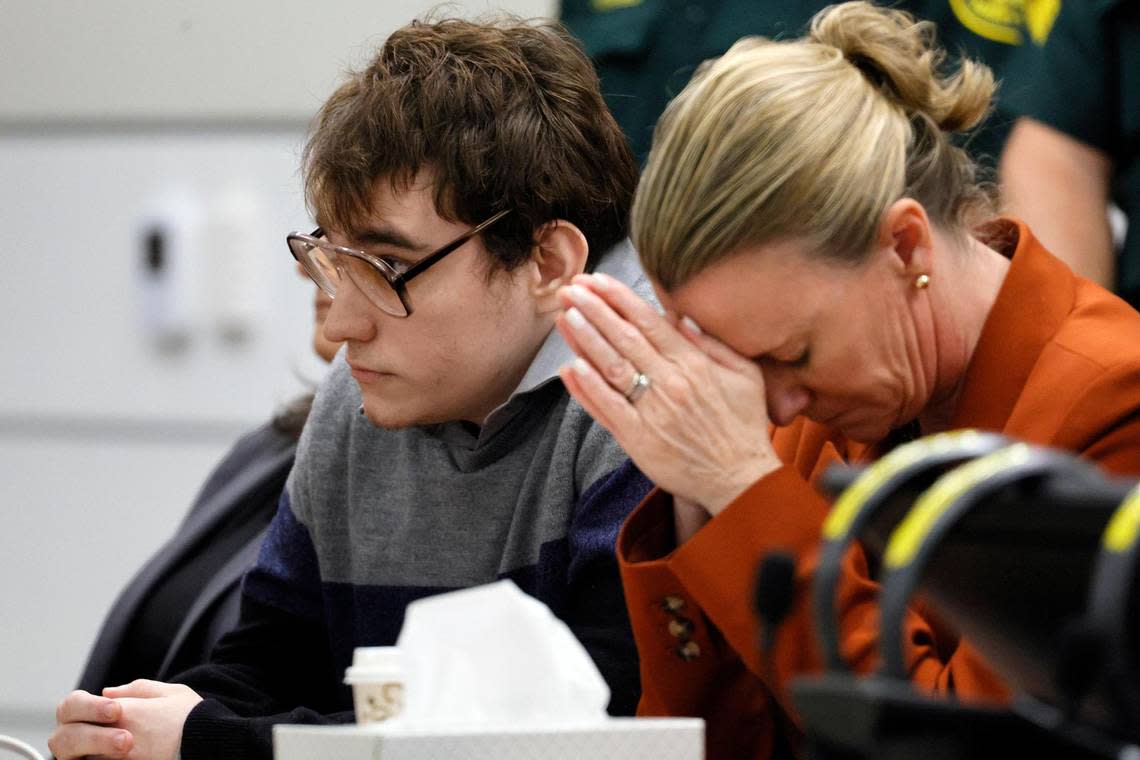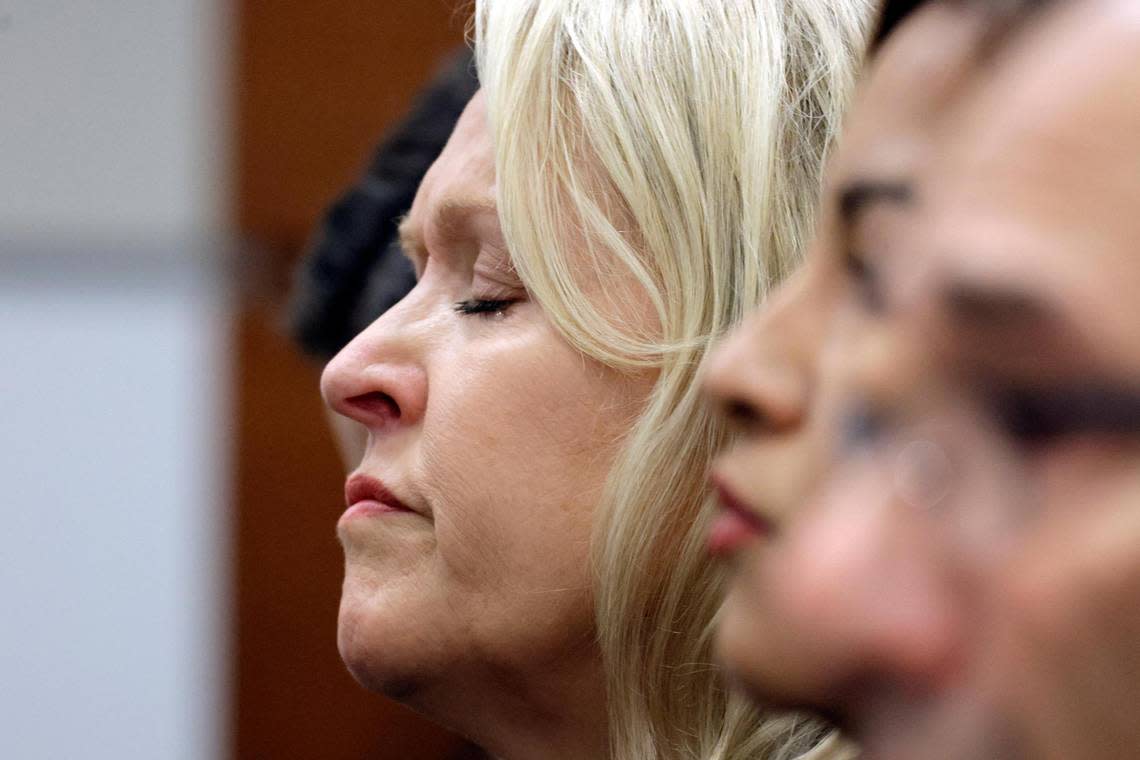‘Jurors let us down.’ Parkland school shooter to get life in prison, death penalty rejected
Nikolas Cruz, who murdered 17 people at a Parkland high school in a mass shooting that shocked the nation, will spend the rest of his life in prison after a jury on Thursday rejected the death penalty.
The decision stunned and angered relatives of the 14 students and three educators who were shot to death during the Feb. 14, 2018, rampage at Marjory Stoneman Douglas High — the deadliest school shooting in Florida history.
They sat in disbelief inside the courtroom as a Broward circuit judge read a lengthy verdict form for nearly an hour. Count by count, the judge read the jury’s decision that the details of Cruz’s troubled life were enough to spare him execution by the state of Florida.
Dr. Ilan Alhadeff, whose daughter Alyssa died in the massacre, appeared to curse quietly when the judge read the verdict in her case. His wife, Lori, buried her face in her hand.
“This should have been the death penalty 100 percent,” Lori Alhadeff told reporters afterward. “I am so beyond disappointed and frustrated by this outcome.”
Ilan Alhadeff said he was “disgusted” with the legal system and with the jurors. “The jurors let us down,” he said.
Broward Circuit Judge Elizabeth Scherer did not immediately sentence Cruz, after prosecutors asked for a full sentencing hearing to allow the relatives of the murdered victims to speak. That hearing was scheduled for Nov. 1.
“I hope that we as a community can respect the verdict that was rendered, respect the process that was had and understand those jurors have spoken and as a community, now begin the process of healing,” said Broward Public Defender Gordon Weekes.

The former MSD student pleaded guilty last year to 17 counts of first-degree murder and 17 counts of attempted murder.
The verdict capped a nearly three-month trial that forced relatives of murdered victims, survivors of the carnage and the South Florida public to relive the trauma of Florida’s deadliest school shooting.
READ MORE: What’s next for death penalty in Florida?
Cruz’s case was the deadliest mass shooting to go to a trial — most mass shooters are killed by police officers, or take their own lives during their attacks.
The few mass shooters who have gone to trial have seen differing results. A jury rejected the death penalty for James Holmes, who killed 12 people at a movie theater in Aurora, Colorado, in 2012 and is now serving a life sentence. A federal jury handed down a death sentence for Dylann Roof, the white supremacist who killed nine church worshipers in Charleston, South Carolina, in 2015.
Cruz’s rampage galvanized student activism. Parkland survivors pushed for gun reform, with Florida’s Republican-dominated Legislature eventually passing a bill that limited some firearm sales and creating a “red flag” law that allows for the seizure of guns from mentally ill people.
The police response to the mass shooting — as has been the case in other school shootings, such as the one earlier this year in Uvalde, Texas — was also heavily criticized. Scot Peterson, the Broward Sheriff’s Office deputy assigned to the school, was charged criminally over his failure to enter the freshman building and confront Cruz.
Broward Sheriff Gregory Tony — appointed to replace Scott Israel by the governor, in large part because of the agency’s response to the Parkland shooting — said he was disappointed with the verdict.
“Despite the fact that the defendant slaughtered 17 innocent people without any remorse, the jury chose to spare his life. I disagree with their verdict,” he said. “In my opinion, every aspect of our criminal justice system collectively failed the victims and their families. Today, the victims’ families were re-victimized.”
READ MORE: White House says verdict ‘brought a measure of justice and accountability’
The shooting also cast a harsh spotlight on how the education and mental-health system handled Cruz’s years of troubling behavior at home and in schools.
Cruz’s penchant for impulsive outbursts and lashing out at fellow students became a key theme at the long-awaited trial in Broward circuit court.
Over weeks of trial, which started on July 18, jurors heard the chilling details about Cruz’s plans to become a notorious school shooter, stocking up on ammunition and tactical gear before taking an Uber to the campus. Inside, he took out his AR-15-style rifle and began mowing down students in hallways, shooting into classrooms, and returning to finish off wounded victims, before escaping among the fleeing crowd.

The Broward Public Defender’s Office had sought to convince the jury that Cruz’s savage killing spree was the end result of a lifetime of poorly treated mental-health woes — arguing that brain damage was caused by his birth mother drinking heavily while he was in the womb.
Jurors on Wednesday afternoon asked to listen to a reading of the earlier cross-examination testimony of Paul Connor, an expert who had told them about Cruz suffering from fetal alcohol spectrum disorder. The jury also asked to view the AR-15-style rifle, which was rendered inoperable and given to them early Thursday.
One juror was adamant against a death sentence, and two others joined in the vote for life, Benjamin Thomas, the foreperson told Herald news partner WFOR-CBS4. “There was one with a hard no — she couldn’t do it — and there was another two that ended up voting the same way,” Thomas said.
One of the jurors who voted for life, in a letter to the judge, disputed supposed chatter from other jurors that she had already made up her mind on the sentence before the trial. “This allegation is untrue and I maintained my oath to the court that I would be fair and unbiased,” she wrote. “The deliberations were very tense and some jurors became extremely unhappy once I mentioned that I would vote for life.”
Families speak out after verdict
One by one, angry family members addressed reporters after the verdict, calling it unjust and arguing it set a terrible precedent and created a road map for future mass shooters to avoid the death penalty.
Ryan Petty, whose 14-year-old daughter Alaina Petty was killed by Cruz, said he couldn’t understand how a juror could conclude Cruz deserved life in prison and not death.
“One juror either didn’t understand the facts in this case or was dishonest with themselves,” Petty said, his voice trailing off. “He [Cruz] went back and shot again and again. I’ve seen the video as part of the MSD commission. I’ll never forget that video. We were hoping for justice. Unfortunately, we didn’t get it today.”
READ MORE: What people are saying about the verdict on social media
Tony Montalto, who lost is 14-year-old daughter Gina in the shooting, said the decision now puts more school children in jeopardy, because shooters no longer have to worry about a death sentence.
“This shooter didn’t show compassion when he put the gun to Gina,” he said. Asked what he’d say to those who don’t believe in the death penalty, Montalto didn’t hesitate.
“Trade places with me and you’ll change your mind,” he said.
Max Schacter, whose 17-year-old son Alex was killed, said he couldn’t understand how Cruz managed to avoid a death sentence.
“He did research. He planned this out. He lied to the Uber driver [who drove him to the school]. He is a sociopath and he did this. He planned it out. It was premeditated,” he said.
The shooting moved many of the Marjory Stoneman Douglas parents on a path they never anticipated. Some have become advocates and are fighting locally and nationally for gun safety measures. Others were appointed to safety commissions or were elected to Broward County’s School Board. Several have created nonprofits, such as Max Schacter’s Safe School for Alex.
Anne Ramsay, who lost her daughter Helena, 17, implored President Joe Biden to enact gun laws and like the other families, she said she was baffled by the jury’s decision.
“We had to listen to how he came back and finished off our loved ones,” she said. “There is no reason in this country to have weapons of war in the streets.”
Fred Guttenberg, who became a national voice for gun control measures after losing his 14-year-old daughter Jaime in the massacre, said he looked at his wife after the verdict and simply said, “shame.”
Linda Schulman spoke for many families when she said no one should feel any pity for Cruz. Her son Scott Beigel, 35, was a geography teacher and cross country running coach before he was gunned down by Cruz.
“He’s going to have to look over his shoulder every second the rest of his life,” she said. “He should live in fear.”
